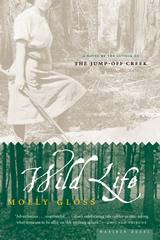When I posted about The Dazzle of Day, several people told me to read Wild Life. I’ve just finished reading it for the second time in a very short period, and thank you, you were absolutely right. What an amazingly brilliant book. This is the best thing I have read for ages.
Wild Life is the story of Charlotte, a Victorian writer of romantic adventures and mother of five, who sets off into the wilderness in search of a lost child and finds something stranger than she could have imagined. (I don’t want to tell you what, because I don’t want to spoil it.) The way the story is written, with diary entries intercut with newspaper cuttings, fragments from Charlotte’s stories, and vignettes of the interior lives of other characters, leads you forward over an abyss you don’t know is there. It’s moving, it’s effective, and it would be a very good book even without that. Charlotte’s early feminism, her rebellious bicycle riding, her fiction deeply influenced by H. Rider Haggard, her ways of coping with her housekeeper and the neighbour who wants to marry her would be enough. I’d have enjoyed the book if that’s all there was to it, a historical perspective on the Pacific North West and logging and nineteenth century independent women. But there is more, and that lifts it from a good book into something altogether astonishing.
Wild Life won the Tiptree Award for work “that explores and expands the roles of women and men”. If you take “women and men” there as “humanity” then it well deserved it. The title is perfect too. And it’s science fiction, not fantasy.
Spoilers coming up, and I really do think this is a case where you should trust me and go read it now and come back. I’ll still be here.
The way Charlotte gets lost and copes with being lost, the way she slowly changes and stops anthropomorphising and animalising the giants she meets, the way she loses language and finds it hard to come back to being human, all of this is done so well I wouldn’t have thought it was possible. I was expecting Bigfoot from the first mention of the legend of the Wild Man of the Woods, and that wasn’t what I got at all. Again I wouldn’t have thought it possible to take such a cliched legend, tall tale, and make of it something as dignified and as real as the people Charlotte meets. Another reason for not writing about them is that Gloss is very careful what words she uses and how and when she uses them, and to give them names seems belittling. I’d noticed before how much Gloss writes about body language and what is shared but unsaid, and that’s very unusual. She really made me believe in this race of human cousins living and dwindling in the dwindling wilderness. Gloss is very good at evoking place and context, and the wilderness here is both large enough to get lost in and never be seen again and also conspicuously dwindling.
The way the book is structured, we know from the beginning that Charlotte returns and becomes a better writer from the experience, and yet I was holding my breath wondering how she was going to survive from moment to moment. This is a book with charming moments, with tense ones, and with a very strong sense of both place and time—not just the Pacific Northwest during the logging boom of the turn of the twentieth century but also that time in Charlotte’s life, and in Melba’s. I especially love Melba’s vignette which makes you realise so poignantly that Charlotte has grandchildren and someone in the present time who has written about her and is interested in her papers, whereas nobody now knows Melba existed at all. Charlotte is half forgotten, but Melba is completely lost. Gloss does all this by describing an afternoon’s ironing and saying how the scent of cedar will always evoke memories of Melba in Charlotte’s boys.
It’s an amazing book and for all that it’s ten years old it seems to be in print. Rush out and buy it while you can.
Jo Walton is a science fiction and fantasy writer. She’s published eight novels, most recently Half a Crown and Lifelode, and two poetry collections. She reads a lot, and blogs about it here regularly. She comes from Wales but lives in Montreal where the food and books are more varied.










